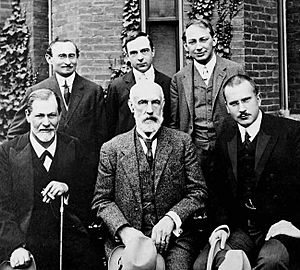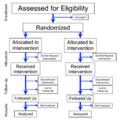Psychology facts for kids


Psychology is the study of the mind and how people think, feel, and act. It's a scientific field that looks at how our brains work and why we behave the way we do.
Psychology mostly focuses on humans, but sometimes it also studies animals. Since the mind is very complex, psychologists often study one small part of it at a time. Psychology is connected to many other subjects, like medicine, computer science, and how we use language.
People who work in this field are called psychologists. They are scientists who try to understand how our mental functions affect our actions, both alone and in groups. They also explore how the body and brain processes influence our thoughts and actions.
Contents
Branches of Psychology
Psychology is divided into different areas called branches. Each branch focuses on specific questions about how people think and act. Here are some common branches:
- Abnormal psychology looks at the differences between people who are mentally healthy and those with a mental illness.
- Clinical psychology helps people recover from mental illnesses.
- Cognitive psychology explores how we think, learn language, remember, forget, and solve problems.
- Cross-cultural psychology studies how different cultures influence the way people live and see the world.
- Developmental psychology examines how people grow and change throughout their lives, from childhood to old age.
- Educational psychology helps students learn and make friends in school.
- Evolutionary psychology considers how evolution might have shaped our thoughts and actions over time.
- Neuropsychology studies the brain and how it works to make us who we are.
- Motivation explores the reasons behind why we do things.
- Perceptual psychology investigates how we understand what we see and hear, and how we use that information to move around.
- Social psychology looks at how groups of people interact and how societies are built and function.
How Psychologists Study People
Scientific Methods
Psychology is a type of science. Research psychologists use many of the same methods as other scientists.
Psychologists create theories to explain behaviors or patterns they observe. Based on their theories, they make predictions. Then, they do experiments or collect information to see if their predictions were correct.
Sometimes, experiments cannot be done on people because they might be too long, expensive, dangerous, or unfair. In such cases, psychologists find other ways to study the mind scientifically. They might observe events as they happen naturally. They could also look at patterns among existing groups of people in their everyday environments. Sometimes, they might do experiments on animals, which can be simpler and more ethical to study.
Like other sciences, a good psychological theory can be proven wrong. If a theory can be tested and shown to be wrong, but experiments don't prove it wrong, then it's more likely to be accurate. This idea is called falsifiability.
Psychologists use many tools in their work. They use surveys to ask people about their feelings and thoughts. They might use special devices to look at the brain and see what it's doing. Psychologists also use computers to collect data when they measure how people react to pictures, words, or other things. They use statistics to help them understand the data from their experiments.
Other Ways of Understanding
Not all psychology uses scientific experiments. Some types of psychology, like Psychodynamic psychology and depth psychology, try to understand the unconscious mind by interpreting people's dreams. Carl Jung was interested in finding ways to measure different personality types.
Humanistic psychology and existential psychology believe it's more important to understand a person's unique meaning and experiences than to just find causes and effects of mental processes.
What Psychologists Do
Psychologists are people who work in the field of psychology. They might do basic research, which means studying people or animals to learn more about them. Or they might do applied research, which means using what they learned to solve real-world problems. If they are trained as a clinical psychologist, they can also be a therapist or counsellor to help people directly.
To become a psychologist, a person usually needs to get a university degree and then go to graduate school. A Master's degree (MSc or MA) allows for some entry-level work, like being a school psychologist. A doctorate degree takes longer because it involves doing a lot of research and writing a detailed report called a dissertation or thesis. People with a doctorate often use the initials PhD or DPhil after their name. Some clinical psychologists earn a Doctor of Psychology (PsyD) degree. In the U.S., the American Psychological Association says you need a PhD or PsyD and a license to call yourself a 'psychologist'.
It's easy to confuse the words psychologist and psychiatrist. A psychiatrist is a medical doctor who has graduated from medical school. They use the initials MD. A psychiatrist or doctor might work with a psychologist. Psychiatrists can prescribe and check on the effects of medications.
Related Pages
Images for kids
-
Wilhelm Wundt (seated) with colleagues in his psychological laboratory, the first of its kind.
-
Skinner's teaching machine, designed to help with programmed instruction.
See also
 In Spanish: Psicología para niños
In Spanish: Psicología para niños
 | Mary Eliza Mahoney |
 | Susie King Taylor |
 | Ida Gray |
 | Eliza Ann Grier |









